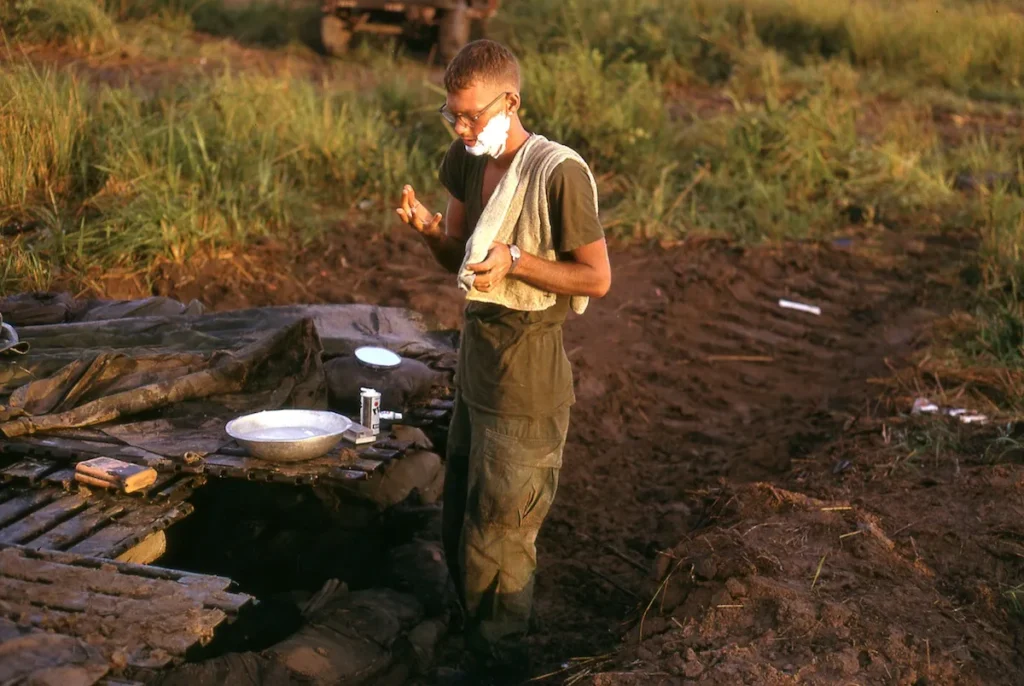
In the shadowed annals of history, where the clamor of battle fades into the quiet ache of memory, there are names that linger like ghosts—unforgotten, yet often unspoken. Sergeant Richard Thomas Jackson is one such name, a young man from Green Bay, Wisconsin, whose life was a brief flame extinguished too soon amid the chaos of war. Born on August 10, 1947, Richard embodied the quiet resolve of a generation drafted into a conflict that tore at the soul of a nation. At just 20 years old, he fell on January 6, 1968, during Operation Yellowstone, his body riddled with fragments from enemy mortar fire at Fire Support Base Burt in Tay Ninh Province. Evacuated to the 45th Surgical Hospital, he succumbed to internal hemorrhaging, leaving behind a legacy etched not in grand monuments, but in the hearts of those who remember.
As a Field Artillery Surveyor with the Headquarters and Headquarters Battery, 2nd Battalion, 77th Artillery Regiment, 25th Infantry Division, Richard’s role was one of precision amid peril—mapping the invisible lines that guided artillery strikes, ensuring his comrades’ survival in a landscape of unrelenting danger. Photographs from his time in Vietnam, captured by fellow soldier Christopher Gaynor, offer haunting glimpses into his humanity: a young sergeant shaving in the open air, the jungle pressing in like a living shroud; or pausing during a convoy, camera in hand, observing villagers with a gaze that held both curiosity and the weight of worlds apart. These images remind us that behind every casualty statistic was a life—full of dreams deferred, laughter shared in fleeting moments of respite, and the unspoken fear that tomorrow might never come.
Richard’s posthumous honors—the Bronze Star with Valor, the Purple Heart, the Combat Infantryman Badge—speak to his bravery, but they cannot capture the profound loss felt by his family, his community, and a nation still grappling with the scars of Vietnam. Buried in Allouez Catholic Cemetery in Green Bay, his name endures on Panel 33E, Line 58 of the Vietnam Veterans Memorial, a solemn testament among over 58,000 others. Yet, in my reflections as a veteran and storyteller, I see Richard not merely as a name on stone, but as a symbol of the invisible wounds carried by so many: the isolation of the survivor, the guilt of the living, the societal neglect that greets returning warriors like a cold wind.
In my own journey through the echoes of war—from the tensions of the Cold War to the familial stories of Vietnam’s toll—I have come to understand that true tribute lies not in platitudes, but in unflinching acknowledgment. Richard’s sacrifice compels us to confront the moral ambiguities of conflict, to nerve our hearts to comfort those still haunted by its shadows. If I should die, and leave you here awhile, be not like others, sore undone… turn again to life, and smile. These words, a poignant invocation, resonate as a call to complete the unfinished tasks of heroes like Richard: to foster healing, to advocate for veterans, to ensure that the freedoms he defended are not taken for granted.
May we honor Sergeant Jackson by living with the same quiet strength he displayed—bridging the fractures of our world with empathy and resolve. Rest in peace, brave soul; your story, though silenced too soon, whispers on.
S. Vincent Anthony
US Army Veteran and Author
September 3, 2025